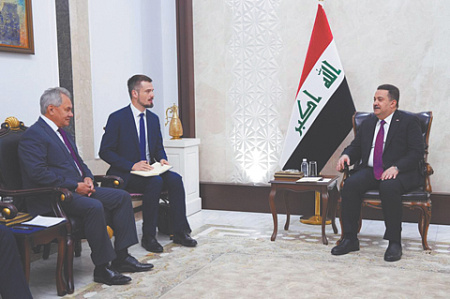
In a significant move signaling shifting alliances in the Middle East, Moscow and Baghdad are in high-level discussions regarding the potential sale of advanced Russian air defense systems to Iraq. The topic headlined a recent visit to the Iraqi capital by Sergey Shoigu, the Secretary of Russia’s Security Council, who emphasized Moscow’s readiness to supply Baghdad with its “most modern types of weapons and military equipment” to navigate the region’s escalating crisis.
The talks come at a critical juncture for Iraq, which is preparing for the withdrawal of the US-led international coalition’s combat mission by the end of 2026. This planned drawdown leaves Baghdad with an urgent need to bolster its sovereign defense capabilities, particularly its control over its own airspace. Iraqi officials have long expressed frustration over their vulnerability, as the country’s territory has frequently become a theater for the shadow war between Iran and Israel, with Israeli aircraft reportedly violating Iraqi airspace to conduct strikes.
According to Mukhtar al-Moussawi, a member of the Iraqi parliament’s foreign relations committee, acquiring modern air defense is a top priority for the federal government. Previous attempts to procure systems from at least six European and Asian countries, including France and Germany, have reportedly stalled or resulted in offers of outdated equipment, with some Iraqi sources attributing the failures to lobbying efforts by Israel. This has positioned Russia as an increasingly attractive alternative partner.
During his meetings, Shoigu made a compelling case for Russian hardware, noting that it has been proven in “real combat conditions”—a clear reference to the war in Ukraine. He positioned Russia as a more flexible supplier than its rivals, offering a wider spectrum of defense solutions, including missile technologies for air and naval forces, which could significantly enhance a partner’s defensive posture in the region.
Underscoring the urgency, Shoigu pointed to the deteriorating security environment across the Middle East. He cited the sharpening Iran-Israel confrontation and condemned a recent Israeli airstrike in Qatar, framing such actions as proof of an uncontrolled crisis that necessitates a stronger Russia-Iraq security dialogue. For Moscow, the regional instability is an opportunity to deepen its partnership with Baghdad and expand its strategic footprint.
However, analysts caution against viewing the situation as a simple replacement of US influence with Russian power. The announced American withdrawal is seen by some as a complex political maneuver rather than a complete departure, with a significant advisory role and presence likely to remain, especially in the semi-autonomous Kurdistan region. The Iraqi government, meanwhile, is engaged in a delicate balancing act, navigating its relationships with the US, neighboring Iran, and Gulf Arab states.
While the prospect of a major arms deal is significant, experts suggest that Russia’s most durable influence in Iraq may ultimately be cultivated through economic projects rather than purely military or political gestures. The Iraqi political landscape remains intricate, with internal power struggles and the complex role of powerful militias complicating any straightforward alignment with a single global power. Baghdad’s maneuvering for greater security autonomy is set to continue, with Moscow now a key player in its strategic calculus.
